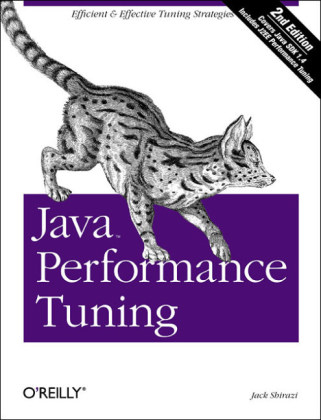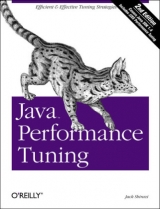Java Performance Tuning
O'Reilly Media (Verlag)
978-0-596-00377-7 (ISBN)
- Titel ist leider vergriffen;
keine Neuauflage - Artikel merken
Performance has been an important issue for Java developers ever since the first version hit the streets. Over the years, Java performance has improved dramatically, but tuning is essential to get the best results, especially for J2EE applications. You can never have code that runs too fast. Java Peformance Tuning, 2nd edition provides a comprehensive and indispensable guide to eliminating all types of performance problems. Using many real-life examples to work through the tuning process in detail, JPT shows how tricks such as minimizing object creation and replacing strings with arrays can really pay off in improving your code's performance. Tuning J2EE applications bears many similarities to tuning J2SE apps, but important and specific considerations apply. For this reason, Java Performance Tuning, Second Edition includes four new chapters: a new chapter on J2EE application tuning in general followed by chapters on tuning JDBC, servlets and JSPs, and EJBs. Java Performance Tuning offers common-sense advice about what to tune and what to leave alone, emphasizing techniques that provide big performance gains with minimal code restructuring.
It gives you crucial guidance that helps you tune without destroying your program's architecture. Blindly changing things in an effort to make a program run faster is a great way to create buggy, unmaintainable code. Java Performance Tuning teaches you to work efficiently and effectively, resulting in code that is robust, maintainable, and fast. Java Performance Tuning, Second Edition shows you how to: * Create a performance plan * Glean information about your program's behavior from profiling tools * Identify bottlenecks before tuning * Minimize the number of objects your program creates, particularly critical for J2EE applications * Optimize the use of strings * Avoid performance penalties from inefficient code * Improve the behavior of loops and switches * Optimize I/O behavior * Use appropriate algorithms for sorting and other common tasks * Use threads effectively * Optimize the performance of distributed systems * Speed up servlets and JSPs * Structure JDBC usage efficiently * Use effective design patterns to optimize EJB performance Covers JDK 1.4
Jack Shirazi is an independent consultant. He was an early adopter of Java, and for the last few years has consulted mainly for the financial sector, focusing on Java performance. Before using Java, Jack spent many years tuning Smalltalk applications. Jack's early career involved research in theoretical physics and bioinformatics. Jack has publications in the field of protein structure and is proud to have contributed to some of the core Perl5 modules.
Preface 1. Introduction Why Is It Slow? The Tuning Game System Limitations and What to Tune A Tuning Strategy Perceived Performance Starting to Tune What to Measure Don't Tune What You Don't Need to Tune Performance Checklist 2. Profiling Tools Measurements and Timings Garbage Collection Method Calls Object-Creation Profiling Monitoring Gross Memory Usage Client/Server Communications Performance Checklist 3. Underlying JDK Improvements Garbage Collection Tuning the Heap Gross Tuning Fine-Tuning the Heap Sharing Memory Replacing JDK Classes Faster VMs Better Optimizing Compilers Sun's Compiler and Runtime Optimizations Compile to Native Machine Code Native Method Calls Uncompressed ZIP/JAR Files Performance Checklist 4. Object Creation Object-Creation Statistics Object Reuse Reference Objects Avoiding Garbage Collection Initialization Early and Late Initialization Performance Checklist 5. Strings The Performance Effects of Strings Compile-Time Versus Runtime Resolution of Strings Conversions to Strings Strings Versus char Arrays String Comparisons and Searches Sorting Internationalized Strings Performance Checklist 6. Exceptions, Assertions, Casts, and Variables Exceptions Assertions Casts Variables Method Parameters Performance Checklist 7. Loops, Switches, and Recursion Loops Tuning a Loop Exception-Terminated Loops Switches Recursion Recursion and Stacks Performance Checklist 8. I/O, Logging, and Console Output Replacing System.out Logging From Raw I/O to Smokin' I/O Serialization Clustering Objects and Counting I/O Operations Compression NIO Performance Checklist 9. Sorting Avoiding Unnecessary Sorting Overhead An Efficient Sorting Framework Better Than O(nlogn) Sorting Performance Checklist 10. Threading User-Interface Thread and Other Threads Race Conditions Deadlocks Synchronization Overhead Timing Multithreaded Tests Atomic Access and Assignment Thread Pools Load Balancing Threaded Problem-Solving Strategies Performance Checklist 11. Appropriate Data Structures and Algorithms Collections Java 2 Collections Hashtables and HashMaps Optimizing Queries Comparing LinkedLists and ArrayLists The RandomAccess Interface Cached Access Caching Examples Finding the Index for Partially Matched Strings Search Trees Performance Checklist 12. Distributed Computing Tools Message Reduction Comparing Communications Layers Caching Batching I Application Partitioning Batching II Low-Level Communication Optimizations Distributed Garbage Collection Databases Web Services Performance Checklist 13. When to Optimize When Not to Optimize Tuning Class Libraries and Beans Analysis Design and Architecture Tuning After Deployment More Factors That Affect Performance Performance Planning Performance Checklist 14. Underlying Operating System and Network Improvements Hard Disks CPU RAM Network I/O Performance Checklist 15. J2EE Performance Tuning Performance Planning J2EE Monitoring and Profiling Tools Measurements: What, Where, and How Load Testing User Perception Cluster
| Erscheint lt. Verlag | 25.2.2003 |
|---|---|
| Zusatzinfo | 1, black & white illustrations |
| Verlagsort | Sebastopol |
| Sprache | englisch |
| Maße | 178 x 233 mm |
| Gewicht | 928 g |
| Themenwelt | Informatik ► Programmiersprachen / -werkzeuge ► Java |
| Mathematik / Informatik ► Informatik ► Web / Internet | |
| ISBN-10 | 0-596-00377-3 / 0596003773 |
| ISBN-13 | 978-0-596-00377-7 / 9780596003777 |
| Zustand | Neuware |
| Haben Sie eine Frage zum Produkt? |
aus dem Bereich




